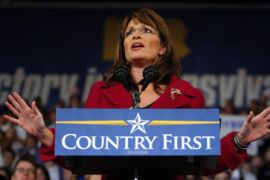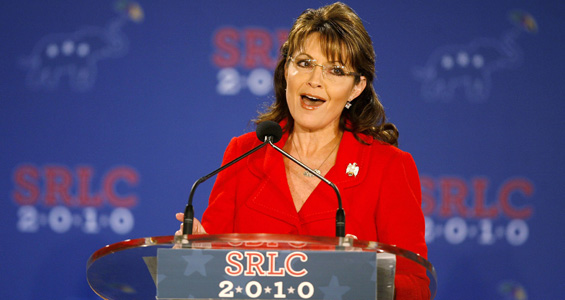Is Sarah Palin the comeback kid?
Speculation is rife that Palin will launch a bid for the White House.

 |
| Palin is popular with the Republican base, but analysts say moderates are not convinced [Reuters] |
November 2008 was a bad month for Sarah Palin. In the aftermath of Barack Obama’s comprehensive victory in the presidential election, this Alaska governor’s surprise appointment as the Republican vice-presidential candidate looked to have backfired badly.
Fast forward 18 months and an unlikely comeback is under way. Gone are the days when Palin’s inexperience on the national stage manifested itself in a series of gaffes on the campaign trail.
Since resigning her governorship in July 2009, Palin has released a best-selling memoir and been given her own prime-time television show.
The 2008 belief by many Americans that she was not up to the task of filling in for John McCain, the Republican presidential candidate at the time, has been quickly replaced by her ascent as the unofficial leader of the right-wing Tea Party movement, considered the opposition bloc to Obama administration policies.
While criticism of Palin was fierce and unrelenting in 2008 – Jerry Mayer, a political analyst at George Mason University, said “picking Palin was the worst mistake and most irresponsible decision a candidate has ever made” – it took only two years for the former governor to orchestrate her political resurgence.
She has now become the most prominent conservative in the US and a populist voice for many Republicans and others who oppose the Obama administration.
A comeback?
Rumours abound in Washington and on TV talk shows that she is positioning herself for a presidential run in 2012.
But could she win?
When Palin had been added to the Republican ticket in 2008, it was in the hope that her folksy charm and deep-held Christian values would broaden McCain’s appeal to the socially conservative wing of the Republican party.
Instead her apparent failure to grasp the basics of international politics alienated moderates and pushed floating voters into the open arms of the Democrats.
Two years later, experts say that for all her recent exposure in the national media, she has made little progress in broadening her support base to the coveted middle ground upon which US elections are fought and won.
“She is enormously popular with Republicans and conservative independents, such as the Tea Party advocates, but Palin has little draw for moderates or Democrats,” says Larry Sabato, an electoral analyst and the director of the University of Virginia’s Center for Politics.
“She consistently loses general election trial heats to Barack Obama, the US president, by wide margins – wider than other Republicans – though no-one would rule her out for the GOP nomination.”
Poll numbers
Poll numbers show that the Palin resurgence may be more heat than light. In February a Washington Post/ABC News poll found that almost 71 per cent of Americans perceived her as unqualified to be president.
More recently, a poll by CBS News found a paltry 24 per cent of Americans held a favourable view of Palin.
Her problem, it seems, lies in the polarising effect she has on voters. The things that conservatives love about her are the things that liberals hate, giving her little of the bi-partisan appeal a successful presidential candidate needs.
She may be met by adoring crowds of tea-partiers celebrating her bombastic attacks on the Obama administration, but for every one of them, the statistics say there are three Americans who do not agree with her views.
Controversy
Despite this, her political clout should not be underestimated. When she said Obama’s unpopular package of healthcare reforms would lead to the creation of “death panels”, she crystallised the fears of many ordinary Americans into two words that dogged efforts to push the legislation through.
|
“If she runs, she’s one of the front-runners” Larry Sabato, electoral analyst |
The description may not have been accurate, but it was certainly effective in stirring up opposition to the reforms.
Part of her strength is her almost uncanny ability to turn the controversy she generates to her own advantage.
She recently encouraged her supporters to “reload” in their battle with Democrats, and used cross-hairs to “target” members of Congress running in upcoming mid-term elections on her Facebook page.
The ensuing row forced Palin to clarify her position on political violence, but rather than apologising, she said the controversy was “BS coming from the lamestream media”.
“Don’t let the conversation be diverted,” she said, urging her followers to “fight hard” for “conservative solutions” in the mid-terms.
Will she run?
There is little doubt that the Republican base is energised ahead of November’s vote and it is clear that Palin is the focal point of much of their excitement.
Analysts say that if she does seek her party’s presidential nomination, she will be a force to be reckoned with for other would-be Republican candidates.
“If she runs, she’s one of the front-runners,” Sabato says. “Will she run? I think she’s having too much fun doing other things and making millions, but who knows for sure?”
And therein lies the rub. The lessons of 2008, combined with recent polling data, may have convinced Palin that she lacks the popular appeal for success in presidential politics.
But as the poster girl of the right, her power seems only to be growing, and that position comes without the tiresome business of winning elections.